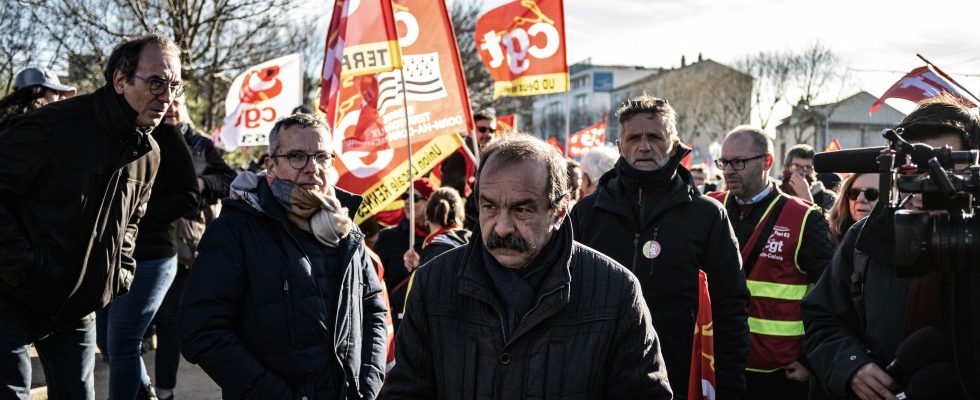Five days after a burst of participation, the tenth day of demonstration against the pension reform brought together, this Tuesday, March 28, significantly fewer people than on the day of March 23. According to the Ministry of the Interior, 740,000 people marched in France, more than 2 million according to the CGT. The inter-union is already planning a new day of mobilization on Thursday, April 6.
The ebb, manifest, was confirmed by the number one of the CFDT, Laurent Berger, who from the head of the Paris procession reported a drop of around 20%. Proportion verified in Nantes, where the unions claimed 60,000 demonstrators, when the prefecture counted 18,000. But the reflux was often greater, down from 30% to 40% in Rennes (13,600 to 25,000), Brest (12,000 to 28,000) or Bayonne (6,500 to 13,000), up to 50% in Montpellier (10,000 to 20,000).
Same trend in the capital, where the CGT announced 450,000 demonstrators, against 800,000 on March 23, the police headquarters having counted 93,000 people on Tuesday.
In Marseille, despite their usual large gap, the numbers of the police (11,000) and the organizers (180,000) fell together by a third. Ditto in smaller towns, such as Guéret, where the two estimates, still very close, have halved to 2,000 participants. The ebb is even more spectacular in Rodez, where the police counted 1,200 demonstrators, five times fewer than on March 23, and the unions 3,000, ten times fewer.
Clashes between demonstrators and the police erupted in several cities including Paris, while the violence during the 9th day of mobilization on March 23, then around the basin of Saint-Soline (Deux-Sèvres) during the week -end, were still in everyone’s mind.
Mobilization is running out of steam again in the public service
After a resurgence of mobilization on March 23, the rate of strikers plunged again on Tuesday in the civil service, only 6.5% of state civil servants having stopped work at midday, according to the government. In this branch of the public service, which has a total of 2.5 million agents, 15.5% of strikers had been identified by the ministry on Thursday during the previous day of mobilization, the first after the government had recourse to 49.3 to pass its pension reform.
Tuesday in the middle of the day, the rate of strikers reached 3.4% in local authorities (2 million agents) and 5.4% in the hospital public service (1.2 million agents). Figures there also down from those of March 23 (6.5% of strikers in the territorial and 8.1% in hospitals). The provisional rate of strikers reached, for example, 16.5% at noon at the SNCF, according to a union source, a mobilization down from previous ones.
Garbage collectors’ strike suspended from Wednesday in Paris
The CGT of the waste and sanitation sector announced on Tuesday the suspension from Wednesday of the garbage collectors’ strike in Paris and the blocking of incinerators, which have caused the accumulation of garbage in the streets of the capital since March 6.
“We need to discuss again with the agents of the waste and sanitation sector of the city of Paris in order to go back to the strike stronger […]because we have almost no more strikers”, recognizes in a press release the CGT-FTDNEEA, which brings together the garbage collectors, sewers, dumpster drivers of the capital. Tuesday, the 23rd day of the movement, the collection of garbage cans remains very disturbed in Paris, the overall volume of uncollected waste is 7,000 tonnes, compared to more than 10,000 last Friday, according to the town hall.
Laurent Nunez invites the Defender of Rights to the command room
Invited from France Inter, the prefect of police argued that Claire Hédon would see “when (he) decides to engage the force”. “She will see that I engage the force when individuals all made up, all in black start to break up businesses”, he continued. “There is not a country in the world where we do not intervene in this kind of situation”. “We intervene with a lot of proportion,” he insisted.
Laurent Berger calls for “mediation” for a way out
“You have to take a month, a month and a half, to ask one, two, three people to mediate”, declared Laurent Berger on France Inter, calling for a “gesture of appeasement to find a way out. “. He again called for “suspending the 64-year measure” which crystallizes the opposition, believing that “entering into a mediation process” would be “a strong gesture to make” on the part of the executive. “What the inter-union is offering today is a gesture of appeasement” that “must be grasped”, said Laurent Berger. A position also defended by the MoDem.
Government spokesman Olivier Véran on Tuesday rejected this request for mediation. “We take Laurent Berger’s proposal to talk to each other, but directly. No need for mediation”, assured the spokesperson during the report of the Council of Ministers. “There is no mediator in the Republic when we can talk to each other directly,” he insisted in response to this proposal from Laurent Berger, supported by the inter-union.
Energy: 15% of service stations lack at least one fuel
Getting around by car is not necessarily easier, with 15% of service stations running out of at least one fuel, especially in the West and South-East. This is the consequence of the shutdown of five of the country’s seven refineries.
Ile-de-France is also affected in turn by fuel shortages. In three departments of the Paris region, more than a third of the service stations thus lack Tuesday morning at least one type of fuel (gasoline and / or diesel) that they offered on March 1: this is the case of Val- de-Marne (44.05%), Essonne (38%) and Yvelines (33.6%).
